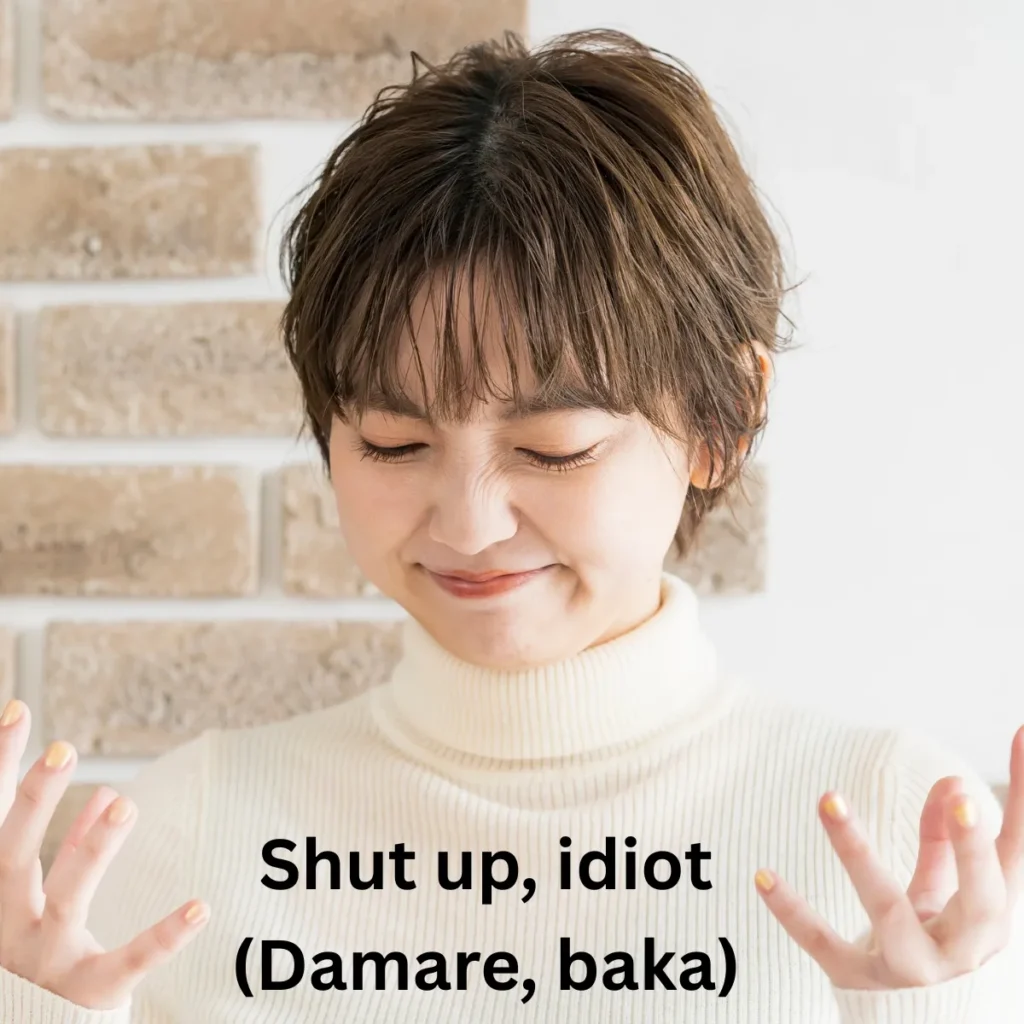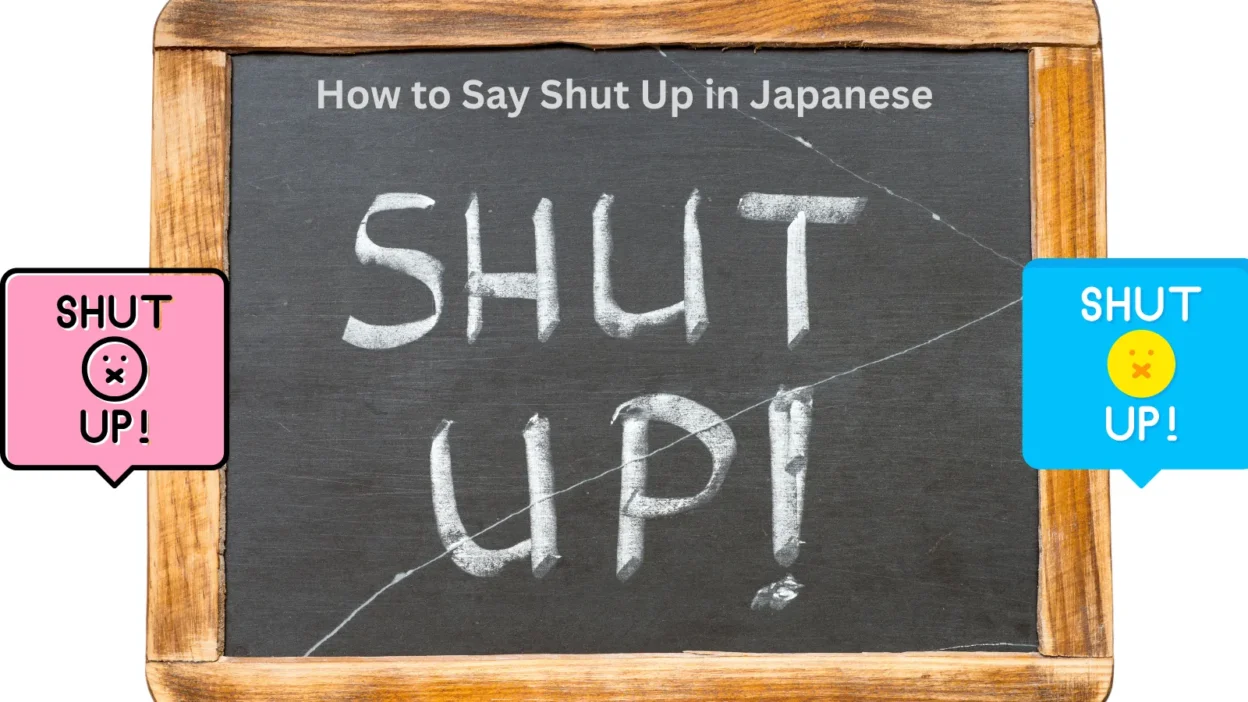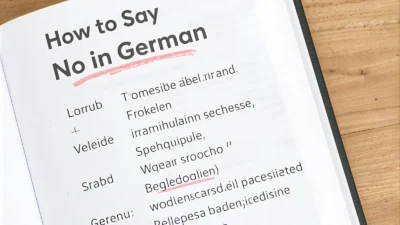“Shut up” in Japanese can be said in different ways depending on tone, situation, and relationship. Japanese language focuses heavily on politeness, so the words used can sound casual, rude, or very strong based on context.
Many users search for how to say shut up in Japanese to understand anime, movies, or casual conversations, or to avoid using the wrong phrase by mistake. The user intent is clear: they want simple explanations that show which words are safe, informal, or offensive.
In this guide, you will learn common Japanese expressions that mean “shut up,” explained in easy words. You’ll also understand when (and when not) to use them, helping you communicate correctly while respecting Japanese culture.
Say Shut Up in Japanese
Let’s explore 15 different ways to say shut up in Japanese, each with a sample conversation and insight into its usage and cultural tone.
15 Ways to Say Shut Up in Japanese
| No. | Japanese Phrase | Romaji | Meaning / Usage |
|---|---|---|---|
| 1 | うるさい | Urusai | You’re noisy / Shut up (mild, common) |
| 2 | だまれ | Damare | Be quiet! / Shut up (strong, rude) |
| 3 | しずかに | Shizuka ni | Be quiet (polite, softer) |
| 4 | 黙って | Damatte | Be silent / Shut up (casual command) |
| 5 | 黙れよ | Damare yo | Shut up! (very harsh) |
| 6 | 口を閉じて | Kuchi o tojite | Close your mouth (literal, softer) |
| 7 | 静かにしてください | Shizuka ni shite kudasai | Please be quiet (polite) |
| 8 | 黙ってください | Damatte kudasai | Please be quiet (more direct, polite form) |
| 9 | うっとうしい | Uttōshii | You’re annoying (implies shut up indirectly) |
| 10 | いい加減にして | Ii kagen ni shite | Enough already! (stop talking) |
| 11 | ちょっと静かに | Chotto shizuka ni | Be a little quiet (gentle) |
| 12 | 黙っとけ | Damatta ke | Shut up (slang, rough) |
| 13 | 黙らないか | Damaranai ka | Won’t you shut up? (forceful) |
| 14 | 黙りなさい | Damari nasai | Be quiet (command, but less harsh than damare) |
| 15 | 口をつぐめ | Kuchi o tsugume | Shut your mouth (old-fashioned, strong) |
1. うるさい (Urusai) – “Noisy!” / “Shut up!”
Origin:
Derived from the adjective urusai meaning “noisy” or “annoying.” It’s the most common way to tell someone to be quiet, often used in daily life or even anime.
Example:
👤 User A: Blah blah blah blah—
👤 User B: うるさいよ!(Urusai yo!) I’m trying to study!
Use: Common and mild; can be firm or teasing depending on tone.
2. だまれ (Damare) – “Shut up!” (Blunt)

Origin:
From the verb damaru (to be silent). This is a command form, and it’s very direct—used when you’re seriously angry.
Example:
👤 User A: You never listen—
👤 User B: だまれ!(Damare!) Enough already!
Use: Harsh; used in arguments, fights, or by authority figures.
3. だまって (Damatte) – “Be quiet”
Origin:
Also from damaru, but this is a softer te-form, used when asking someone to be quiet without sounding aggressive.
Example:
👤 User A: Let me tell you more—
👤 User B: ちょっと、だまって。(Chotto, damatte.) I’m on the phone.
Use: Polite to neutral; depends on voice tone.
4. 静かにして (Shizuka ni shite) – “Keep it down”
Origin:
From shizuka (quiet) and suru (to do). It’s a respectful way to say “please be quiet.”
Example:
👤 User A: [Loud in the library]
👤 User B: 静かにしてくれませんか?(Shizuka ni shite kuremasen ka?) Could you keep it down?
Use: Polite and common in public places or classrooms.
5. 黙れ、バカ (Damare, baka) – “Shut up, idiot!”

Origin:
Combines “damare” with “baka” (fool/idiot). Often heard in anime and dramatic situations.
Example:
👤 User A: I’m better than you at everything—
👤 User B: 黙れ、バカ!(Damare, baka!) You’re so full of yourself!
Use: Rude and confrontational. Not for real-life use unless you’re acting!
6. ちょっと静かに (Chotto shizuka ni) – “Can you be a bit quiet?”
Origin:
“Chotto” softens the tone, making it more like “just a little quiet, please.”
Example:
👤 User A: [Kids being noisy]
👤 User B: ちょっと静かにしようね~。(Chotto shizuka ni shiyou ne~.) Let’s be a little quieter, okay?
Use: Gentle, often used with children or in polite company.
7. しーっ!(Shii!) – “Shhh!”

Origin:
Onomatopoeic sound just like the English “shhh.” Common in both Japanese and Western cultures.
Example:
👤 User A: [Talking in a theater]
👤 User B: しーっ!(Shii!) The movie’s starting!
Use: Universal and non-verbal; polite but firm.
8. 口を閉じろ (Kuchi wo tojiro) – “Close your mouth!”
Origin:
Literally means “close your mouth.” Very direct and strong.
Example:
👤 User A: You’re always complaining!
👤 User B: 口を閉じろ!(Kuchi wo tojiro!) I don’t want to hear it!
Use: Harsh and commanding; can sound militaristic.
9. 黙ってくれる?(Damatte kureru?) – “Can you be quiet, please?”
Origin:
A more polite request form of “damatte.”
Example:
👤 User A: Keeps interrupting a meeting
👤 User B: ちょっと、黙ってくれる?(Chotto, damatte kureru?) Can I finish?
Use: Slightly firm but still polite.
10. 静かにしなさい (Shizuka ni shinasai) – “Be quiet!” (Command)
Origin:
Often used by teachers or parents. The shinasai form is an imperative used with children or subordinates.
Example:
👤 User A: [Arguing loudly]
👤 User B: 静かにしなさい!(Shizuka ni shinasai!) That’s enough noise!
Use: Authoritative, used by adults or in school.
11. いい加減にして (Ii kagen ni shite) – “Enough already!”
Origin:
Means “cut it out” or “don’t go too far.” It’s more about stopping annoying behavior than literal noise.
Example:
👤 User A: Keeps making foolish jokes
👤 User B: いい加減にしてよ!(Ii kagen ni shite yo!) You’re to get on one’s last nerve!
Use: Frustrated tone; not necessarily about volume.
12. そのへんにしとけ (Sono hen ni shitoke) – “You better stop there”

Origin:
A masculine phrase often used in action dramas or movies.
Example:
👤 User A: Keeps provoking
👤 User B: そのへんにしとけ。(Sono hen ni shitoke.) You don’t want to go further.
Use: Serious and threatening tone; very masculine.
13. うっせーな!(Ussee na!) – “You’re so loud!” (Slang)
Origin:
A contracted, slangy version of “urusai na.” Used in manga, anime, or casual speech among teens.
Example:
👤 User A: Singing loudly
👤 User B: うっせーな!(Ussee na!) Can you not?
Use: Rude or joking, depending on tone.
14. もういいよ (Mou ii yo) – “That’s enough / I’m done”
Origin:
Means “That’s enough” or “Forget it.” It implies emotional exhaustion rather than direct command.
Example:
👤 User A: Keeps blaming
👤 User B: もういいよ。(Mou ii yo.) I’ve had enough.
Use: Emotional or passive-aggressive; not literally “shut up.”
15. 静かに願います (Shizuka ni negaimasu) – “We ask for silence”
Origin:
Very formal, used in announcements, signs, and customer service environments.
Example:
🔈 Announcement: ただいま、試験中です。静かに願います。
(Tadaima, shiken-chuu desu. Shizuka ni negaimasu.) An exam is in progress. Please keep quiet.
Use: Polite and official.
FAQs:
1. What is the most common way to say “Shut Up” in Japanese?
The casual and direct way is “黙れ” (Damare), which can sound rude if used inappropriately.
2. How do I say “Shut Up” politely in Japanese?
A softer and more polite way is “静かにしてください” (Shizuka ni shite kudasai), meaning “Please be quiet.”
3. Can I use slang to tell someone to shut up in Japanese?
Yes! Words like “うるさい” (Urusai) literally mean “Noisy!” and are often used casually among friends.
4. Is it rude to say “Damare” in Japanese?
Yes, “Damare” is strong and can be considered offensive, especially toward elders or strangers.
5. How do I tell someone to be quiet in a classroom or meeting?
Use “静かにしてください” (Shizuka ni shite kudasai) to politely ask for silence without offending anyone.
6. Can I use gestures with “Shut Up” in Japanese?
Yes! Placing a finger to your lips while saying “静かに” (Shizuka ni) emphasizes your request politely.
7. How do I say “Stop talking” in Japanese?
You can say “話すのをやめて” (Hanasu no o yamete), which literally means “Stop talking.”
8. Can I say “Shut Up” jokingly among friends?
Yes! Among close friends, casual phrases like “うるさい” (Urusai) or playful gestures are acceptable.
9. Is there a difference between informal and formal “Shut Up” in Japanese?
Yes. Informal: “黙れ” (Damare), Formal/Polite: “静かにしてください” (Shizuka ni shite kudasai). Context is important.
10. Are there regional variations in saying “Shut Up” in Japan?
Minor differences exist, but “黙れ”, “うるさい”, and “静かにしてください” are widely understood throughout Japan.
Conclusion:
Learning how to say shut up in Japanese helps you understand not only the words but also the cultural sensitivity behind them. From the softer urusai to stronger expressions like damare, each phrase carries a different level of intensity. By choosing the right one, you’ll communicate more effectively without sounding rude or offensive.



